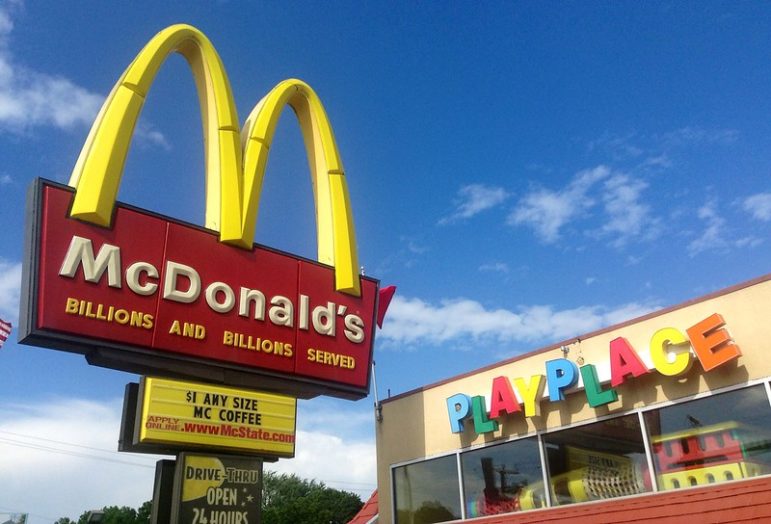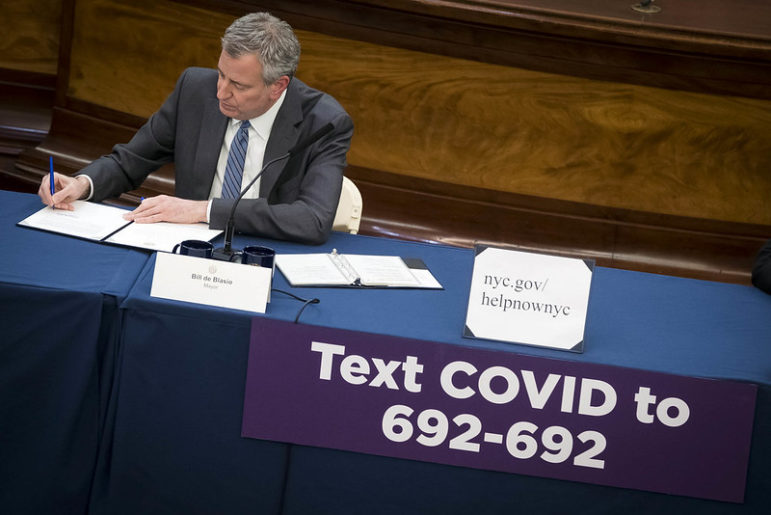
As New York Gov. Andrew Cuomo on Friday announced that all non-essential workers mst stay home beginning Sunday night, advocates and restaurant workers held a media telebriefing in which they described their current situation and asked for emergency policies in order to survive this crisis.
For example, in most places in New York State, if a restaurant worker tests positive for COVID-19, her employer could make her stay home without pay, or fire her for taking sick days, explained Teófilo Reyes, Deputy Director of Programs and Research at Restaurant Opportunities Centers (ROC) United. Thus, one of the demands of restaurant workers is paid sick days.
Paid sick leave is already the law in New York City, and Westchester County has a similar law. But those protections are rare elsewhere. “As more businesses close, the pressure on workers who are still at work becomes ever greater. When a worker tests positive as has happened at Waffle House in Georgia and Panera Bread in Iowa, they are forced to leave work without any benefits. This encourages the workers who are still at work to keep quiet about any symptoms,” Reyes said.
The concern about sick leave is only one worry facing restaurant workers. A deeper one is that their jobs could vanish even if they stay healthy.
“To date, 36 states and the District of Columbia have shut down their restaurants and other public-facing businesses. An additional three have restricted access to customers. Millions of restaurant workers have had their hours drastically cut, and millions more have been thrown out of work entirely,” Reyes said.
“In New York City alone, an estimated 500,000 workers will lose their jobs by the end of the month,” says a statement from ROC.
According to restaurant workers, large corporate chains such as Applebee’s, IHOP and Denny’s haven’t stepped forward to deal with their workers’ situation. For example, based on a leaked recording, McDonald’s fought against parts of Trump’s coronavirus bill that would give workers paid sick leave. “McDonald’s and the National Restaurant Association are leading the lobbying charge to prevent emergency paid sick leave,” Reyes said. (McDonald’s says it supports the bill but took issue with a financing mechanism within it.)
So far, Darden Restaurants and Chili’s have shown some solidarity with their workers, offering economic assistance to their hourly employees, advocates said. “However, Chili’s, DINE Brands (owner of Applebee’s and IHOP), Denny’s, and other major chains still refuse to adopt a paid sick leave measure,” said Reyes.

Ed Reed/Mayoral Photography Office.
Read our coverage of the Coronavirus crisisFor example, Darden announced that full-time workers will get up to five paid sick days —accrued paid sick days, depending on the worker’s length of service. But according to Pronita Gupta, Job Quality Director at the Center for Law and Social Policy (CLASP), workers should get up to 10 days of paid sick leave for the coronavirus pandemic, as well as paid family and medical leave, and unemployment insurance.
According to ROC-United, 55 percent of restaurant workers in the U.S. are employed by national and regional chains. “We know that well over 20 percent of restaurant workers are now unemployed or have seen their hours drastically cut,” said Reyes.
James Cadwell, a 63-year-old server who has worked the past 16 years at an Olive Garden near Pittsburgh, said that there is “no health insurance from the company.”
Cadwell said, “My pay rate started at $2.83 per hour plus tips —and now, after 16 years, I get $2.83 per hour, plus tips!” Due to this situation, Cadwell says that he is “worried about [his] next paycheck. I already applied for unemployment.”
And this stressful situation was shared by other restaurant workers. “Since March 12th, when closures around the city started to happen, I have not received a paycheck,” said Portia Green, a Harlem resident and a single mother of a 13-year-old daughter. “I have been spending time with my daughter at home, but I am also worried about what will happen to us in the coming days, weeks or months.”









2 thoughts on “Restaurant Workers Amid COVID-19: Essential, At Risk, Unprotected”
It is extremely evident that the only thing that is important to larger companies is money. When it comes down to it you know they can care less about the people that continue to make their business grow. As soon as finances get touched employees become expendable.
I work for ihop as a salary manager. I urged all my employees to start filing. It’s not safe. I wish desperately that I could do more for them. But unfortunately franchises and corporations are all different and the same.
My city has been on “lockdown” for 3 weeks, but I still see people shopping like normal and no one following social distancing rules..
all restaurants went to take out only.. but it’s almost worse! Now I get it I still have a job and shouldn’t be upset! But I took a pay cut. I also still have to work a minimum of 55 hrs. There’s no safe way to set up dine out rules.. there’s door dash, Uber, Postmates, Grubhub! Then you have your call in and pick ups. Curbside. Online ordering it’s fucking chaos! It me and my gm working everyday. It’s scary. It’s stressful. It’s boring. It’s a waste. It’s a blessing. It’s all too much!
I made signs about not entering dining area or kitchen(to keep it sanitized to keep me safe my manager safe you safe your mom safe you moms mom safe etc)! And my district manager told me that’s not hospitable! And took them down and wrote a mass email to not display signs to “scare the public”. She’s now at home with flu like symptoms.